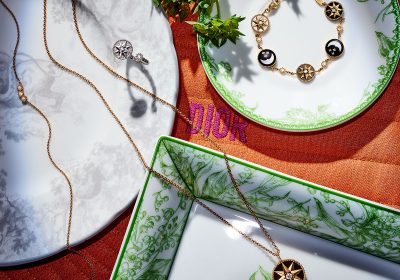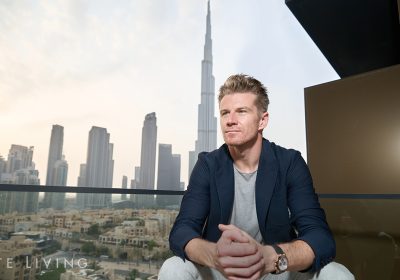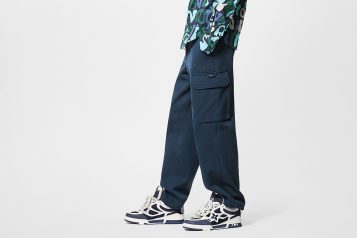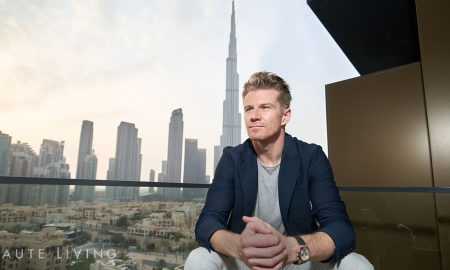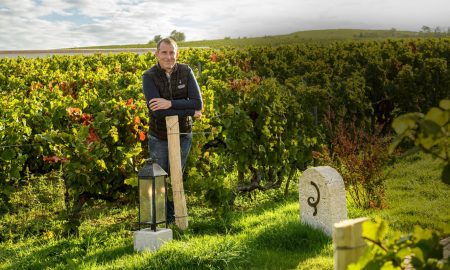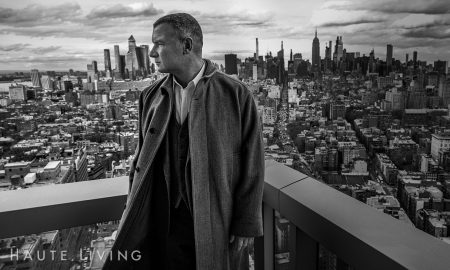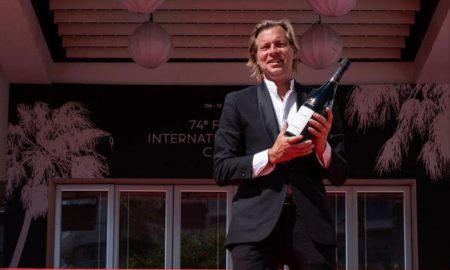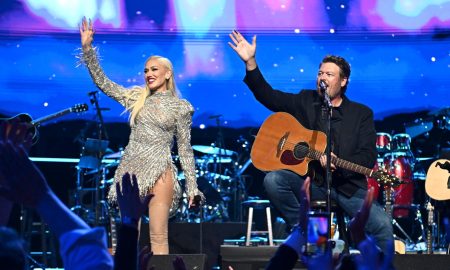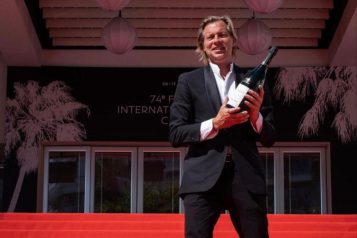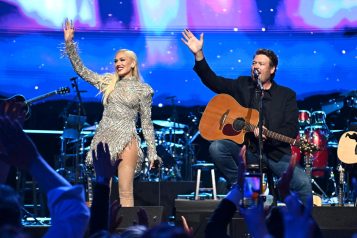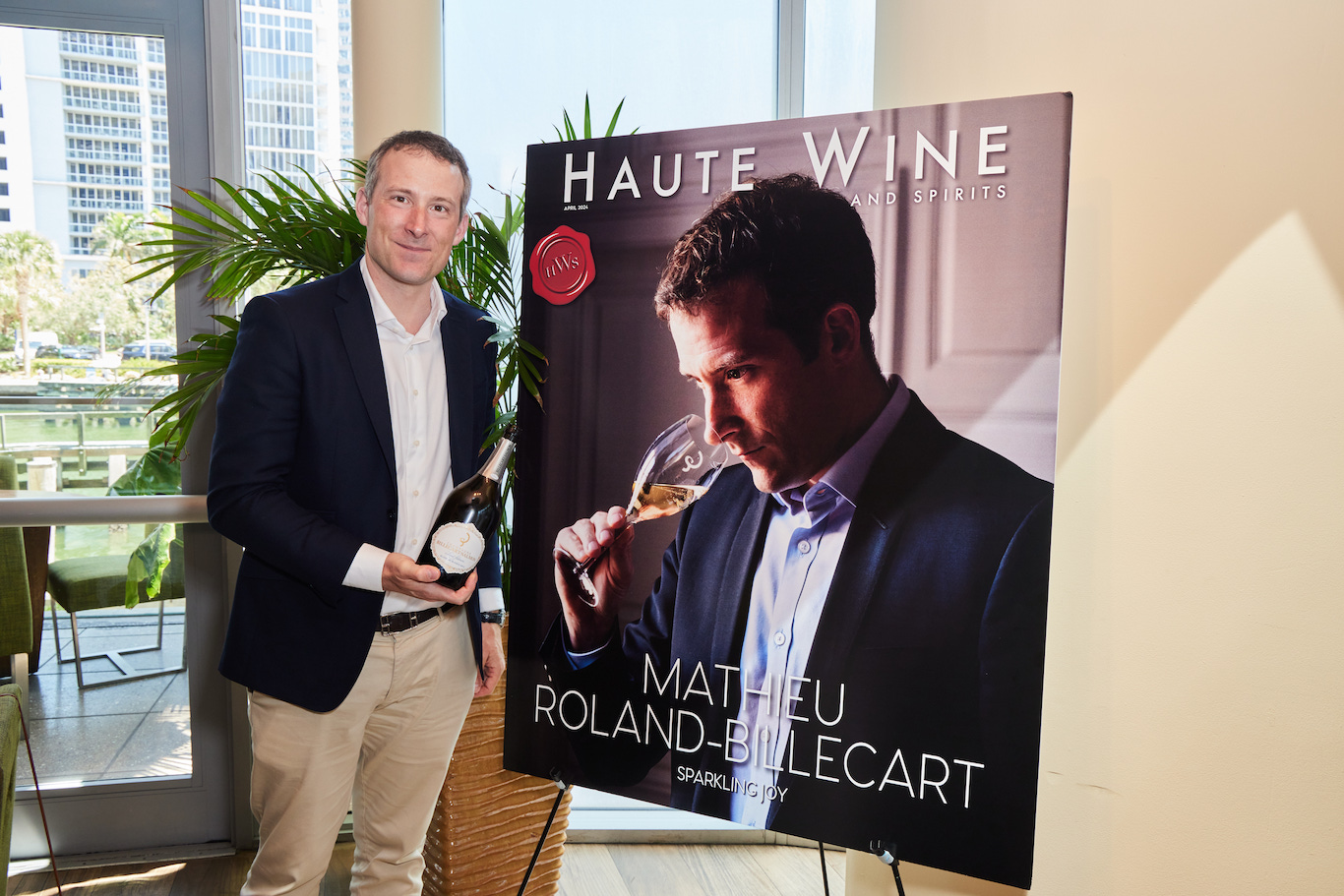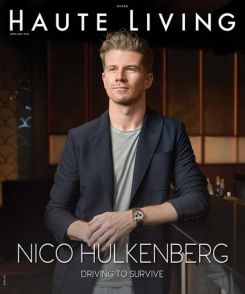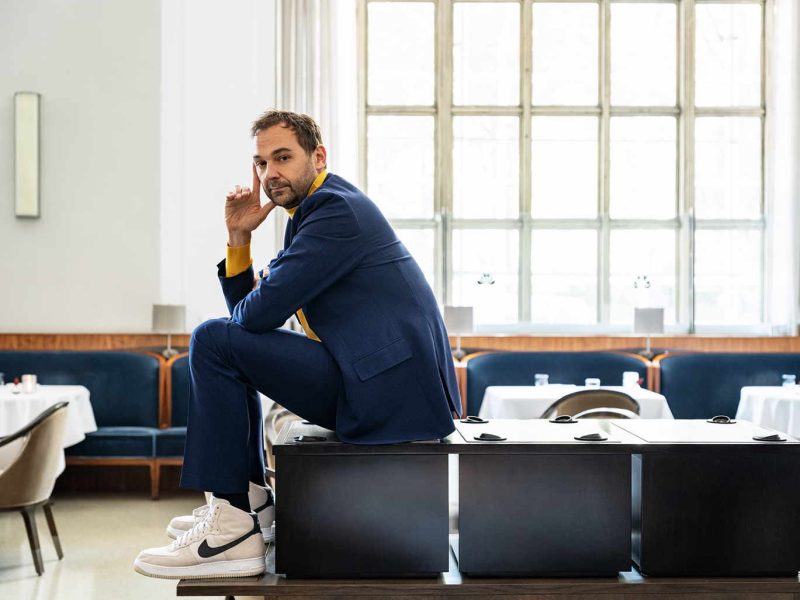 Photo Credit: Scott McDermott
Photo Credit: Scott McDermott
DANIEL HUMM HAS REWRITTEN THE GOURMET RULEBOOK, AND THE MICHELIN GUIDE HAS TAKEN NOTICE JUST IN TIME FOR THE 25TH ANNIVERSARY OF HIS ELEVEN MADISON PARK.
BY LAURA SCHREFFLER
PHOTOGRAPHY SCOTT MCDERMOTT
GROOMING CHICHI SAITO
SHOT ON LOCATION AT ELEVEN MADISON PARK
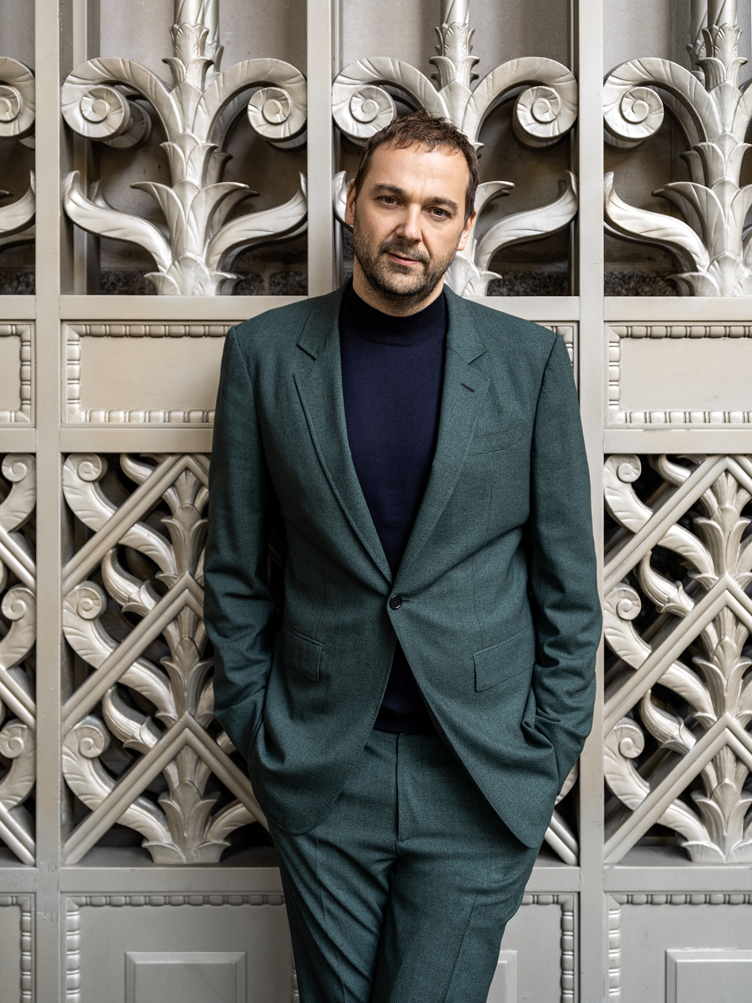 Photo Credit: Scott McDermott
Photo Credit: Scott McDermott
11:11 — an “angel number,” if you will — is an important number for many, and perhaps no one feels its seemingly mystical impact more keenly than Daniel Humm. Not only has his Flatiron District restaurant, Eleven Madison Park, earned 3 Michelin stars for the past 11 years — the first time actually being in 2011 — but precisely 11 years later, it sailed into uncharted territory by becoming the only vegan restaurant in the world to receive the Michelin Guide’s highest honor.
“Eleven is definitely my number. For me, it’s a reminder that there’s a new door to always open, no matter how impossible it might seem,” the 45-year-old Swiss-born chef announces.
That door officially opened three weeks prior to our October Zoom chat, and for all intents and purposes, Humm is still reeling from receiving this previously unthinkable accolade.
“I never thought we would get three stars — never in a million years. I thought it was impossible. But then I started thinking about the number 11, and how we received our first 3 Michelin stars 11 years ago. I definitely paused and was like, Well, wouldn’t that be something.”
It’s “something” alright — something that the highly decorated Humm declares to be the greatest achievement of his career. That’s a big statement for a man who received his first Michelin star at age 24, and another 14 times since. (He received his first star for Eleven Madison Park in 2010, then purchased the restaurant from restaurateur Danny Meyer’s Union Square Hospitality Group the following year.)
“To create something that no one else has ever done before is incredible, and I don’t know when I’ll have another opportunity like this again,” he admits, noting that “having that excitement after all these years is the most incredible part of all. The energy and motivation here is electric.”
As it happens, his decision to transform Eleven Madison Park’s menu into a meat-free domain was the best he could have possibly made, for a plethora of reasons. First and foremost, in creating something new, he got his joy of cooking back. Prior to deciding to go vegan, he had been suffering from success fatigue — professional burnout. Essentially, Humm was bored.
“Honestly, when I was at the height of — if you want to say my ‘critical acclaim’ — number one in the world, there wasn’t an award I didn’t receive. But actually, I didn’t feel all that happy because I was being pulled in so many different directions. Everyone wanted me to open restaurants in different places. So many things pulled me away from the work that I really wanted to do that, when the pandemic hit, [my world] became just about cooking again. I became aware that my language is food, that this language can speak loudly, that it’s a meaningful language.”
He wanted to use this love language to do something more, and with New York restaurants completely shuttered in 2020, in collaboration with Rethink Food (a nonprofit aimed at creating a more equitable, sustainable food system), he transformed Eleven Madison Park into an extremely elevated commissary, making sure the restaurant’s essential purpose — to feed — remained intact. “I decided to go down this path after the pandemic. We fed — and are still feeding — people in need. In cooking for people that are food insecure, I reconnected with food in a whole new way, [and] after it became clear that Eleven Madison Park would reopen, I made a commitment to myself that I would use this language for good, and that things would have to change. Our food system is broken, and so professionally, I felt obligated to speak up. But [I also wanted to] create the future, to use my energy to bring magic to plant-based dining, to make it beautiful and exciting, and so I made a conscious decision [to change things up],” he says. (The title of his fourth cookbook, Eleven Madison Park: The Next Chapter, though released in 2019, was especially indicative of this shift.)
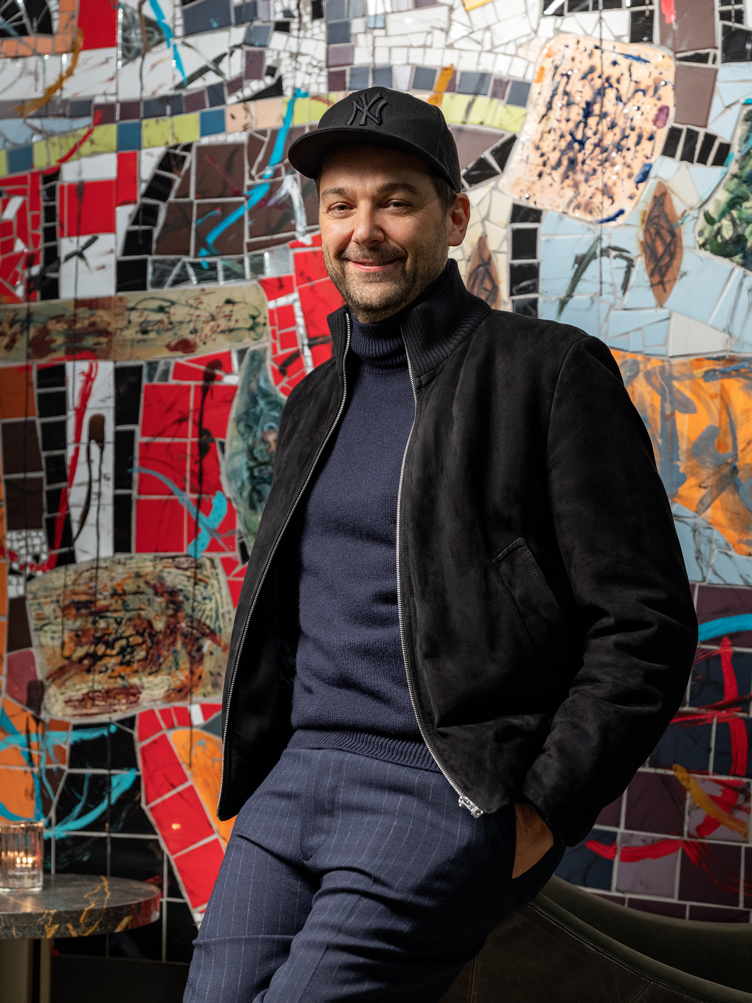 Photo Credit: Scott McDermott
Photo Credit: Scott McDermott
And though for Humm it felt like a necessary evolution, it was also an incredibly bold move that sent distress signals around the world. Up until 2021, his establishment was known to highlight the crème de la crème of “luxury” ingredients, offering guests far and wide a seasonal, 8- to 10-course tasting menu that drew inspiration from local culture and history. Foods such as caviar, lobster, and Kobe beef were — literally and metaphorically — always on the table at the restaurant, which had not only appeared on the World’s 50 Best Restaurants list nine times but was also a six-time James Beard honoree. In fact, in 2017, Eleven Madison Park had the singular distinction of being named the best restaurant in the world. That Humm would mess with this kind of perfection was mind-boggling to many; his worldwide acolytes were truly baffled by his decision.
And so, the chef found himself making headlines, and not in a good way. “There was a lot of controversy. When we made the announcement, there were many who thought it was a PR stunt. They’d say, ‘Veganism is ruining Daniel Humm,’’’ he says, his honeyed (yet sniffly) tone conveying exactly what he thought of this particular headline. Yet, he admits, “It’s hard to be criticized. People are scared of change, but I think when you do something that’s truly in your heart, in a way, there is only winning.”
What was in his heart was a desire to do something different. Although he was constantly changing up the menu at Eleven Madison Park (and constantly receiving reassurance that this rotating system was superb), he felt stifled by it — creatively stagnant. “The idea of being best chef in the world made me feel kind of empty,” he divulges. “That’s such a silly thing anyway because there are so many great chefs, but it also didn’t feel like that the work that we were doing mattered enough to deserve such an accolade. I believe that when you’re at the height of critical acclaim, it’s not necessarily a time when you’re actually doing your best work. I had been cooking for 25 years, and all of a sudden it seemed like, that in those two years prior to becoming the best, everyone was suddenly telling me how great I was. It’s a funny thing to get so much attention. But for me, it didn’t quite connect to the importance of the work.”
Additionally, he felt it disingenuous to consistently work with such expensive foods, especially because he no longer enjoyed them. “To have yet another version of a caviar dish, or foie gras topped with black truffles, is boring. All of these things, they aren’t really even luxurious anymore; they’re old ideas. They might be expensive, but it’s not like they’re rare. It’s not like they even taste that good. To me, the most luxurious ingredient is time, and if I can have a unique experience — one that is only available in one place — to me, that is also a luxury,” he notes.
What’s important, he says, is the kind of praise he’s receiving now (which is on a slightly larger scale than his all-time favorite compliment: having artist Paul McCarthy compare his cuisine to a Robert Ryman painting). Humm pauses for a moment to read some powerful praise from Gwendal Poullennec, the international director of the Michelin Guides: “‘Quite simply, Chef Daniel Humm’s team at Eleven Madison Park has set the standard for plant-based dining. Becoming the world’s first vegan restaurant to earn 3 Michelin stars is a landmark achievement. It encourages young chefs to take bold steps in creating innovative dining experiences that please the palate, emphasize the importance of sustainability, and inspire change within the culinary landscape. Eleven Madison Park is the North Star they can fix their eyes upon as they navigate their gastronomic journey.’”
He pauses and blinks. “That’s just so … big. ‘The North Star.’ It’s a historical moment in dining. Michelin has really written the rules, set the precedent for what fine dining is. And with these stars, it’s their way of acknowledging the future.”
And for Daniel Humm, this is only the beginning.
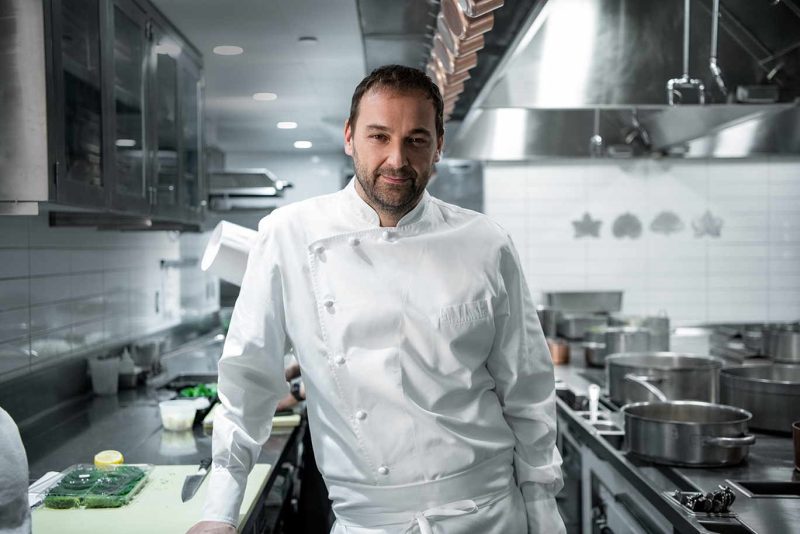 Photo Credit: Scott McDermott
Photo Credit: Scott McDermott
HUMM, WHO IS RECOVERING at the time of our chat after being sick, has just finished telling me his superhero origin story, and it goes like this: Although he was exposed to cooking at a young age and began working in kitchens as early as age 14 in his native Strengelbach, Switzerland, his real dream was to be a professional cyclist. But when he was 24, he was involved in a terrible accident that left him in a coma. When he woke up, he had some tough decisions to make about the path his life would take.
“I thought about my future, and I knew that I didn’t want to continue with the sport of cycling, and I thought, I should be a chef. And I want to be the best chef, because I was an athlete, and the only way an athlete measures is by competing,” he explains.
And for the next 20 years, he set out on a continuous quest for greatness, revealing that he didn’t truly pause to consider the path he was on until Eleven Madison Park was named best restaurant in the world. “[At that time] I started to be like, Oh wow, the view up here isn’t actually as great as I thought it was. I started to question things. And then the pandemic came, and it gave me an opportunity to take a step back and to rethink. You know, I’m young — I’m 45 years old — and I have many years ahead of me. I knew that I didn’t want to go back to this old way, and I knew that I wanted to create a different path forward.”
He’s doing that now by exploring different cultures, picking up global techniques from India and Japan, among other countries that have a heavy focus on vegetarian and vegan cuisine. He even hosted a Japanese monk in New York for over a month to learn from him. “We want to go out there in the world more and just learn from other cultures, but we also wanted to have 3 Michelin stars as a vegan restaurant before we wanted to play around within those rules that we created. And now, we are no longer playing the same game. We’re now part of writing the rules,” he says proudly.
While Humm finds charting these new waters exhilarating, he does note that there’s a lot of responsibility that comes with being the first. Incidentally, this is also Humm’s reason for refusing to expand his reach beyond his current restaurant, although he had previously opened the NoMad hotel chain restaurants, as well as the now-shuttered Davies and Brook at Claridge’s in London (his first eatery outside of the U.S.).
“I really want to focus on just one restaurant,” he says now. “I don’t want to create a global empire. I want to focus on my craft. Eleven Madison Park is the most beautiful restaurant in the world, in the most beautiful city. It’s my home, and I’m really happy to feel so engaged with the place that has been my life for the last 20 years.”
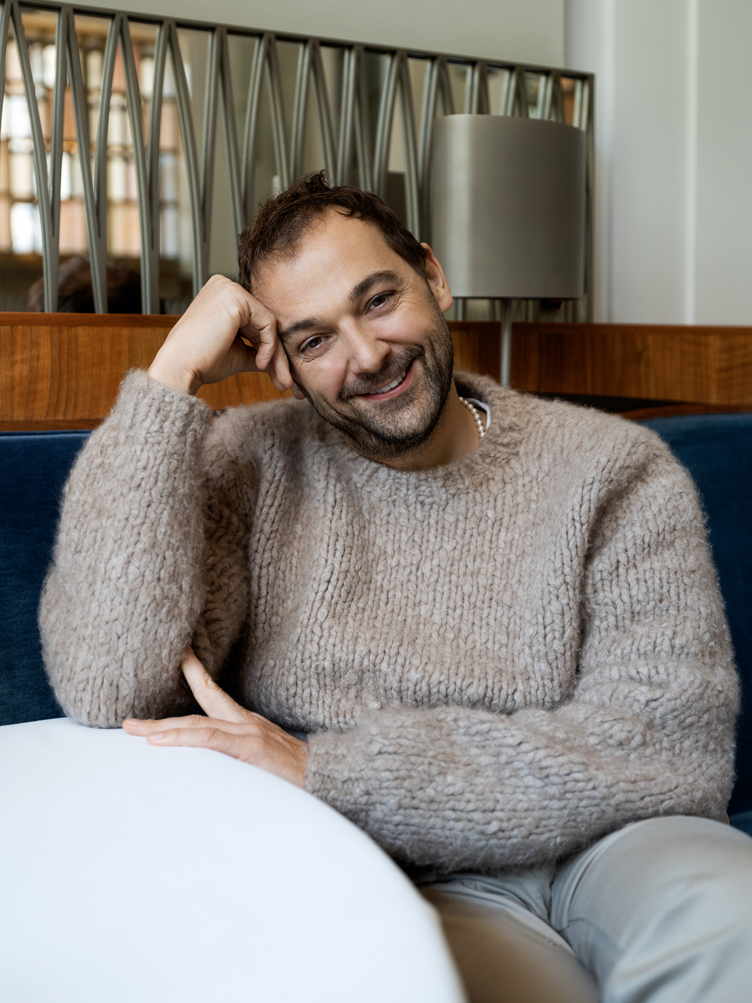 Photo Credit: Scott McDermott
Photo Credit: Scott McDermott
He is open to expanding, but meaningfully, and so his current missions are to keep innovating here at Eleven Madison Park; to keep his (now plant-based-loving) customers happy with Eleven Madison Home, his collection of plant-based kitchen essentials, pantry staples, and ready-to-eat snacks; and to give back in any way that he feasibly can. The latter is nothing new: it has always been the intention behind his hospitality company, Make It Nice, which he launched with former business partner Will Guidara in 2011. So Humm isn’t opposed to taking on new projects, but they do have to have a rhyme and a reason and align completely with his own.
“Our slogan has always been ‘make it nice,’ but I think today it’s more like ‘make it matter.’ I think ‘make it nice’ isn’t quite enough anymore. If a pop-up or any other opportunities arise, [my reason for agreeing to do it] just needs to matter beyond giving pleasure to people. It needs to make a difference. It needs to show a different way forward — like-minded people who want to make a difference, people who are not afraid of pushing boundaries. Then I would say, ‘Yeah.’”
So, for the time being, he’s going to soak in the sensation of doing something different, let it simmer, and carefully and deliberately plot his next move. “It’s truly incredible to think that we are still at the beginning of this journey,” he marvels, which is why his plan is this: “Right now, I’m going slow, and I’m going to make every move matter,” he explains, adding, “People always ask me, ‘What’s next, what’s next, what’s next?’ And I’m just like, ‘Well, we’re continuing to do the work.’ Our restaurant feeds 500 people every single day for free; we cook extra meals and deliver those meals to Queensbridge [the largest housing project in America]. You know, make it matter.”
He coughs delicately before continuing. “This is a conflict that I have struggled with forever — to have privilege. Obsessing over ingredients the way we do, in a world where some people have no food. It’s very expensive to dine at a restaurant, and that’s a conflict. I’m also aware that I’ve become a voice in our industry, and I want to use it with responsibility.”
Even — and perhaps especially — if that means he has to put himself in the limelight, which is something he has truly never been a fan of.
“I’m really introverted, and that’s the truth,” he admits. “That’s why I chose a career in the kitchen, behind the scenes. When I started cooking, the cooks were never seen; we’d go through a back entrance or through a basement, and that’s how I felt most comfortable. But with being [a public figure], I had to become more extroverted. But it’s not what brings me joy.”
That begs an obvious question.
Which Humm obligingly answers. “What brings me joy is just that, right now, so much of my life now feels like it did at the beginning of my career, where it was all about creating. And right now, people are actually paying attention to just that. I know that every dish we create today, the world will see. It’s amazing getting to do what I love and feeling that love for it again. For example, Keith Richards, no matter how big the Rolling Stones were going to get, he is always going to play the guitar. It’s not like they could get so big that he would stop playing the guitar. That’s true for me, too. In my world, at times, the success became so big that I wasn’t in the kitchen anymore. I think, because of COVID and just taking the focus back to one restaurant, [that has been given] back to me. I am playing the guitar again, and that’s what gives me the most joy.”
And when I ask how he feels, right now, at this very second — sickness and all — his answer is so vehement, there can be no question as to its truth.
“I feel very grounded. I feel energized — and pretty fucking happy.”
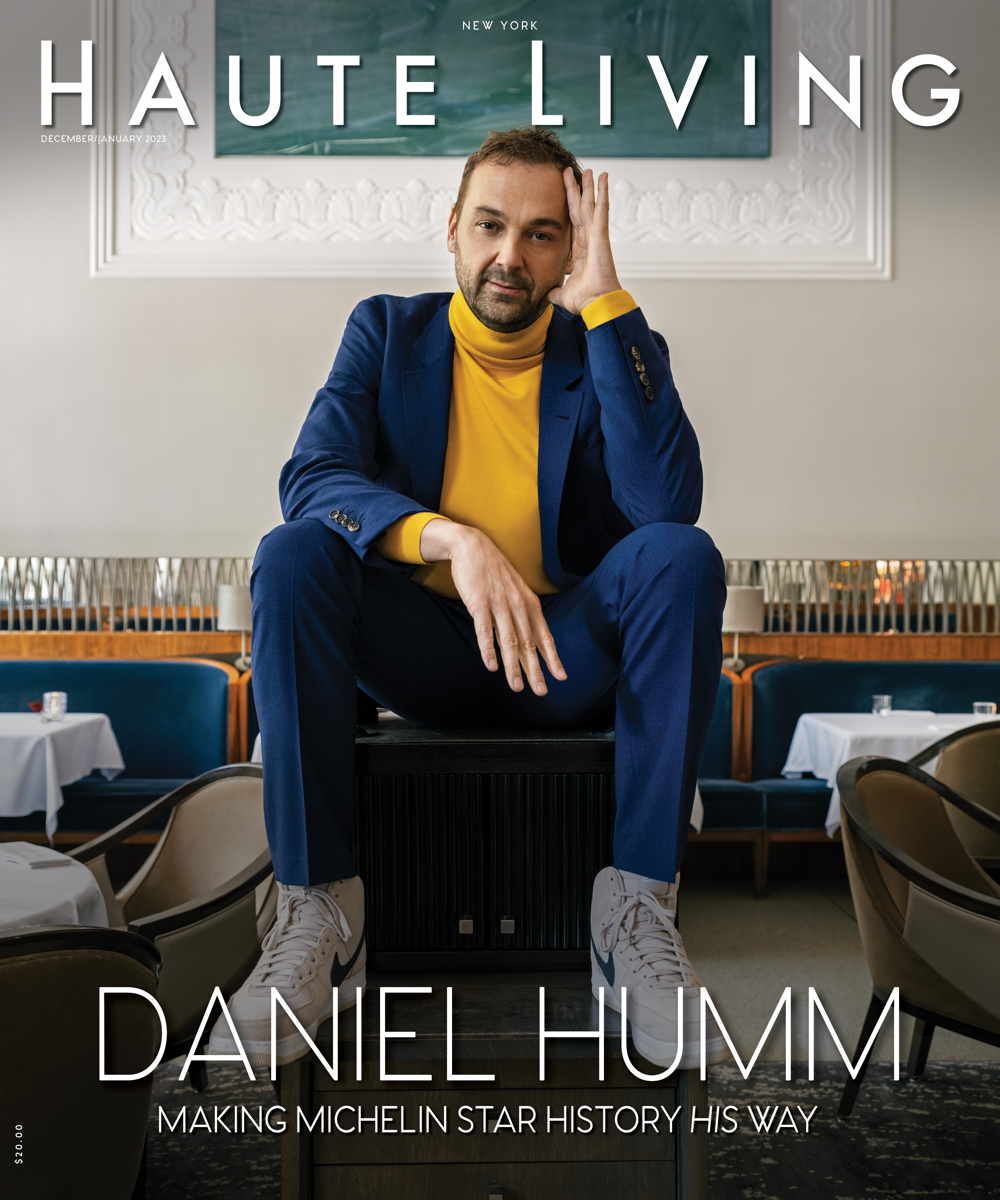 Photo Credit: Scott McDermott
Photo Credit: Scott McDermott






